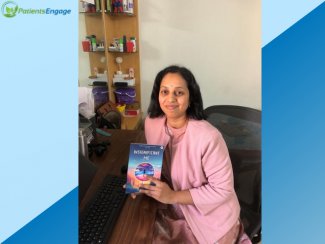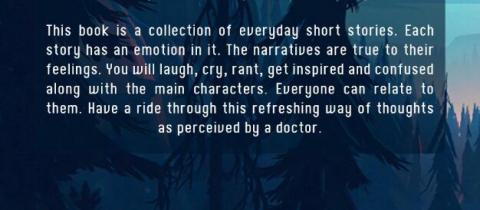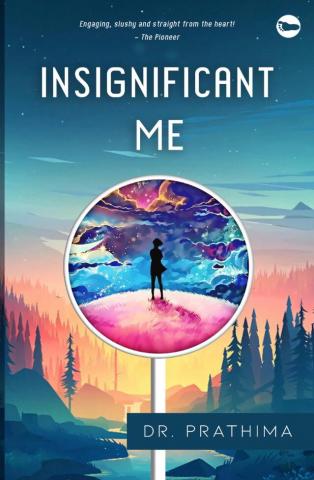
Dr Prathima, 41 is a General Physician, and was diagnosed with Young Onset Parkinson’s Disease (YOPD) in her late thirties. She shares her struggles and fears, as well as her strategies for coping with the challenges and pent up tensions.
Please tell us a bit about your condition
I am 41 years old and was diagnosed with Young Onset Parkinson’s Disease (YOPD) approximately 4 years ago. Initially the symptoms were very subtle and being a doctor myself, I managed to get a timely diagnosis. Over time, I could see the full gravity of the diagnosis. The symptoms are predominantly on my right side. I struggle to write because of tremors. I cannot do much with my rigid hand because of stiffness and slowness. My right leg lags behind the left while walking and I have difficulty walking when tired.. I have not had a fall so far, but I do have balancing issues.
I have delayed gastric motility, leading to reflux and cough and vomiting.
I also go through apathy in the evenings. I feel very tired and am in no mood to do anything.
I also have sleepless nights and daytime sleepiness.
What were the early symptoms?
Occasional tremors in right hand ,slowness in writing, difficulty in brushing my teeth, difficulty with procedures as a doctor.
Is there any history of Parkinsons’ Disease in your family?
My maternal grandfather’s elder brother had Parkinsons
Please describe your experience of managing the condition?
I do regular exercises and have also tried boxing to help me with co ordination.
Yoga and meditation help me focus and make me feel better when I am in a low mood.
I alternate between cardio, yoga, pranayama, everyday for 30 minutes.
I do take naps in the morning and sometimes in the afternoon and find them very refreshing.
Career wise – I only do part time work. I work on weekends, and sit at my clinic on Saturdays and Sundays.
Rest of the days I do clinical work on appointment basis and few hours of online teaching and consultations.
Did your being a doctor, help in diagnosis and treatment?
Yes, I had an early diagnosis, and better access to information and experts. Treatment wise, I was able to communicate my symptoms in the medical language.
You have been affected with YOPD. How is it different from PD being diagnosed at a later stage in life?
As a YOPD, I look at PD in later stages of life and think, they had few more years of good life than us. Sometimes I see this as a natural process of aging in the elderly - if not PD - then they have strokes or osteoarthritis or a combination of other diseases. Sorry, I am not being insensitive but diseases are more acceptable in the elderly than in the young, since there are economic factors, and to live with these symptoms for longer periods puts pressure on finances as well.
What medications are you on?
Pamipraxole
Medapor
Syndopa
Were there any side-effects of the medicines?
Nausea and vomiting
Decreasing efficacy
Fluctuating benefit
What were some of the challenges you faced and what is your advice to patients who face similar challenges?
My challenges were a loss of dexterity and inability to perform procedures at work and even write a prescription. With medication I am able to write. I have also employed an assistant to help me with prescriptions. It is much easier to type on a keyboard than to write by hand.
I also had sleep problems. Therefore, I resorted to listening to music and writing.
I have also had bouts of low mood and a feeling of apathy. Writing has helped me focus and deviate on gaining new knowledge for the book ,rather than ponder over negative thoughts.
What kind of specialists do you consult and how often?
Movement disorder specialists for a 3-6 months review
What are the least understood aspects of PD?
Once you accept your disease you move on to the next phase – will my kids be affected? Did I pass on my genes to my kids? Its a horrifying thought, and you suffer from very guilty feelings.Its ok if you have to suffer with a disease, but to see your kids go through the same is a very scary feeling.
Genetics and play between genes and environmental factors.
There is always this question whether young onset Parkinson’s is hereditary and what are your chances of passing it to your kids.There are so many genes involved and when any of these genes get turned on is still clearly not known.
Is it really helpful in knowing whether your kids will inherit?
I am not sure. If I have no idea what will happen I probably will at least have the hope that maybe they will not get the disease. On the other hand, if I knew they would, I may plan on their career choices, insurance and other aspects, despite being well aware that life is unpredictable.
Have you had to make some changes to your lifestyle because of your condition?
I work part time. I have employed a cook to help in the kitchen.
I am not much interested in visiting others or welcoming guests because of the anxiety of them noticing my tremors. It was only in my book that I revealed my diagnosis.
I am very particular about my footwear. I wear sneakers most days, I wear heels on very few days unlike earlier.
I still travel frequently but carry less baggage.
I wear very little makeup. Although for some reason with my exercises and food habits, I do have a natural glow these days.
I like to plan early and leave ahead for travel or functions – difficult for me to cope with last minute changes.
Have you tried complementary medicine or therapies, like homeopathy or yoga?
Yes yoga and Ayurveda.
I have done Ayurveda body massages, and followed sattvic diet and yoga/meditation.
Saatvic diet is mainly during retreats.
Other days I usually start my day with fruits, limit my coffee to one cup a day. In general, calorie intake has decreased – most days only two meals a day.
Most days I am good at controlling my cravings but somedays I give in to chocolate, fries, frizzy drinks.
Has it been difficult emotionally to cope with your condition?
Yes, very much. The mood swings with medications, sudden bouts of apathy are often difficult to handle. My interests have also changed.
I have also been scared of not being able to work like before and losing my financial independence.
My coping strategies have been listening to music. Some of the lyrics have provided me with confidence that I am not alone.
I also read a lot of books and listen to podcasts.
I am now focusing on promoting my book.
You are now an author. What do your stories talk about? Does PD play a role in your stories? And has being a writer been an outlet for you?
My book is a compilation of everyday experiences as a doctor, as a PD patient and as nobody. Definitely writing has been an outlet and has helped me cope. I published my experiences since some of them are motivating and uplifting.
Writing has opened avenues for a new world and being able to influence others through writing seems like a new secret weapon.
How has your family supported you?
My family supports me very strongly I have described this in my book as well
Did you see a counselor for support? Were you offered counselling by doctor?
No
What was the hardest part of the treatment? And what kept you going?
Fuzzy feeling, nausea and vomiting with the medications were some of my hardest experiences It takes a few weeks to adjust to the medicine dose, but eventually medications helped.
Grateful to my family for taking short shuffling steps with me, for my kids' hugs and kisses, my friends who hold my trembling hand, for my solitude, boxing, walking, Ayurveda, meditation, yoga, the occasional seaside retreat, KBR Park, Amish tripathi books, various support session podcasts. Not a single day passes by where I am not exploring something new.
Is there any personal anecdote that you would like to share with us?
Funnily enough, I started writing when I cannot write properly. Who knows, I may one day fly when I cannot even walk.
More about the book








